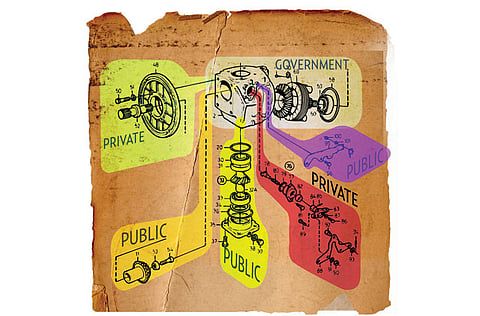Practical outsource solution cited
Joint ownership seen as logical short-term step in providing public services

Abu Dhabi: A majority of countries in the Middle East and North Africa (Mena) region lack the necessary institutional capabilities to effectively outsource public services to the private sector, a new report from global management consultancy firm Booz and Company said Wedneday.
The firm also said a new model of partnership was emerging — joint ownership — that could transform how public-private partnerships (PPPs) are structured.
The report said that "joint ownership can be a highly practical and logical short-term solution" in emerging markets where there is a dearth of suitable private partners to take on public service projects.
In joint ownership, both the government and the private sector have a stake in a newly-formed corporation. On the public side, the owners typically include entities within government that will consume the service, whereas on the private side, the owners may include the company responsible for developing the service or providing startup capital.
Commitment
George Atalla, a partner at Booz and Company, said: "New joint ownership arrangements create new companies and introduce completely new services — those that governments want to provision in partnership with the private sector".
"This is unique and should make the private sector more confident of the government's commitment and of the degree of alignment likely to exist between the two sides," Atalla said.
"A set of services that might otherwise require years to introduce can be brought out relatively quickly. However, joint ownership should always be regarded as a temporary solution, never as a permanent one."
In the Mena region, the concept of PPPs is still in its infancy and the proposed new approach of joint ownership may seem a long way off.
However, in the UAE, and Abu Dhabi in particular, many government entities have already embraced the private sector in a bid to achieve their key strategies.
For example, Abu Dhabi Education Council (Adec) is working closely with private school operators, including Nord Anglia, Beaconhouse and Cognition, to enhance the operation of public schools in Abu Dhabi.
Adec launched the PPP pilot project in September 2006 in 30 schools with students from kindergarten to Grade Five, with four operators — 12 in Al Ain, 12 in Abu Dhabi and six in Al Gharbiya. By the start of the 2009-10 school year, the number had grown to include 176 public schools and nine operators.
Michael Cooper, Director of Project Finance at HSBC, said: "Abu Dhabi has undoubtedly embraced the concept of PPPs to a greater degree than other governments in the region".
"PPPs bring many benefits, principally in terms of efficiency and delivery of services," Cooper said. "Too much focus is placed on the apparent savings that PPPs can bring but more importantly is the quality of service that can be achieved, especially as that is what governments are charged with delivering.
"It does take time for people to be trained and educated on a new procurement approach. In the GCC, the number of PPP arrangements has gradually increased over the last five years.
Outside of Abu Dhabi, the concept is still very much at an early stage.
But Kuwait, Bahrain and Qatar have already entered into PPPs in the fields of transport infrastructure, waste management and tourism development.
"The key to a successful PPP is taking the time to develop the contractual framework and receive expert advice. As a result, it [the product/service] takes longer to reach the market but the effort and expense is repaid in the long term."
The Mubadala Development Company, described as one of Abu Dhabi's leading investment companies, said it had also embarked on a number of PPPs in various sectors over the past few years.
Ali Eid Al Muhairi, Dir-ector of Business Development at Mubadala Infrastructure, said: "The PPP model enables some of the risk to be shared with the private sector, thereby encouraging commercial rigour while also freeing up public funds to invest in other development projects".
"Partnership and collaboration is central to Mubadala's approach," Al Muhairi said. "We work with world-class partners in sectors where we believe there is a strong strategic rationale for investment, and where we can identify clear ways of fulfilling our mandate to support the diversification of Abu Dhabi's economy while delivering both a financial and social return.
"In terms of traditional PPPs, we've had a great deal of success in advancing some of our key assets. For instance, the PPP model has been an extremely effective way of delivering our university projects with the Paris Sorbonne Abu Dhabi completed in August, 2010, and the two new UAE University and Zayed University campuses scheduled for completion in the second half of next year.
"To take the example of our university projects, and from a purely social standpoint, by building these universities, Mubadala is developing the infrastructure that will ensure Abu Dhabi's ability to provide world-class educational opportunities. Once completed, the three universities will have the capacity to offer academic programmes leading to bachelors and masters degrees for 23,000 students. Naturally, we would expect these world-class educational facilities to have a long-term positive impact on the Abu Dhabi economy."
Public-private partners
A public-private partnership is any collaboration between a public body, such as a local authority or government entity, and a private company.
The arrangements are typified by joint work between the two sectors and can cover various partnerships to deliver policies, services and infrastructure.
There is no defined structure to a PPP and the relationship between the two sectors can range from outsourcing of services to a situation whereby both parties have a shared equity interest. The structure tends to vary depending on the level of risk allocated to the private sector.
Sign up for the Daily Briefing
Get the latest news and updates straight to your inbox



